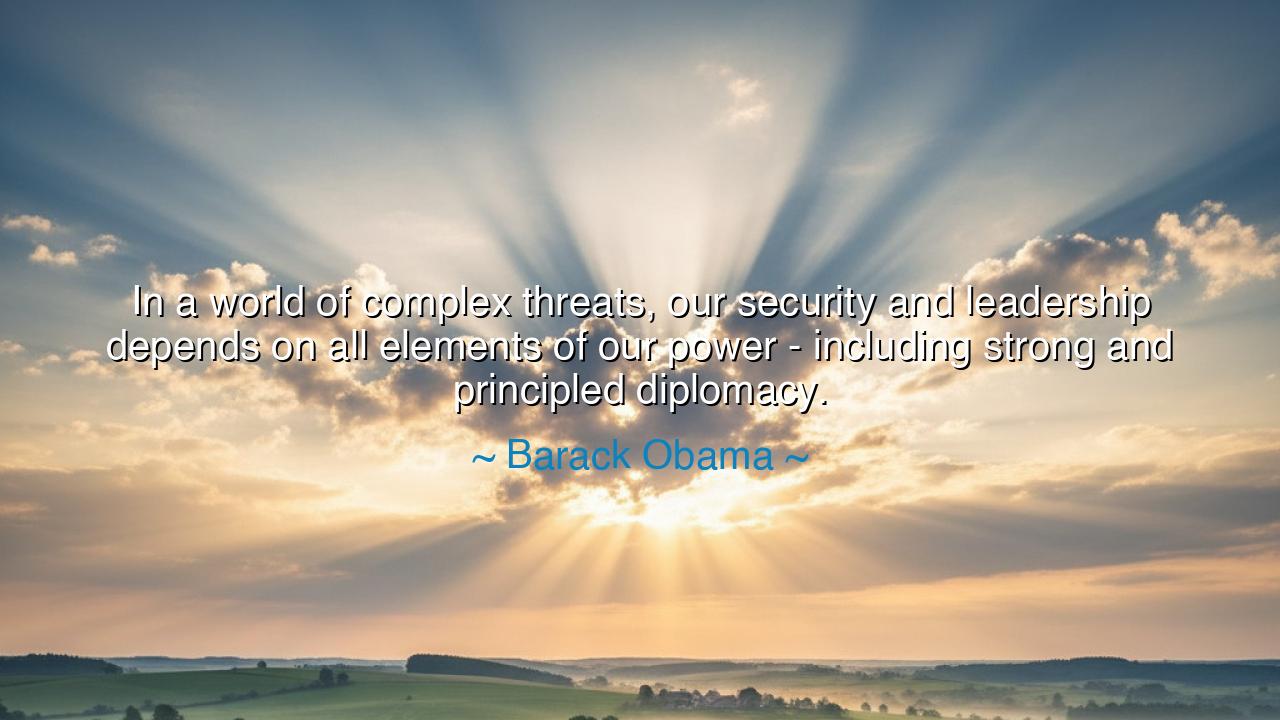
In a world of complex threats, our security and leadership
In a world of complex threats, our security and leadership depends on all elements of our power - including strong and principled diplomacy.






Hear, O children of wisdom and guardians of peace, the words of Barack Obama, a leader who rose in an age of turmoil and uncertainty: “In a world of complex threats, our security and leadership depend on all elements of our power — including strong and principled diplomacy.” In this declaration lies not merely a lesson of nations, but a truth for all humanity — that true strength is not found in might alone, but in the harmony of wisdom, restraint, and understanding. For when the world trembles with chaos, it is not the loudest voice that prevails, but the one that listens, reasons, and acts with principle.
Obama, who led at a time when war had wearied nations and new dangers crept unseen — of terror, of poverty, of division — spoke these words to remind us that leadership must be whole. The sword may guard the body, but only diplomacy guards the soul. He understood that every age faces complex threats, not just of armies and weapons, but of fear, pride, and misunderstanding among peoples. And so he called upon the leaders of the world to wield not only force, but also dialogue — to use persuasion, compassion, and integrity as instruments of peace. For the true measure of power is not domination, but the ability to unite and heal.
From the dawn of civilization, this wisdom has echoed through time. When King Ashoka of India, having conquered his rivals through bloodshed, looked upon the battlefield strewn with the fallen, he felt the hollowness of victory won without virtue. In that moment, he laid down the sword and took up the mantle of principled diplomacy — sending emissaries of peace across his empire, teaching kindness, tolerance, and cooperation among nations. His reign became one of harmony, not fear. Thus was proven the eternal law: that security built upon violence alone will crumble, but peace rooted in justice will endure beyond generations.
So too did Nelson Mandela, after long years in the prison of Robben Island, choose not vengeance but reconciliation. He stood before a divided nation and said, “Let us build, not destroy.” His strength lay not in armies, but in his heart — in his unyielding belief that leadership requires mercy as well as courage. Through his diplomacy, South Africa was transformed. In his restraint, the world saw power; in his forgiveness, the world saw greatness. These are the deeds that live beyond monuments and centuries, for they prove that peace, though fragile, is stronger than the iron of war.
Obama’s words speak, then, not only to rulers but to all who seek to lead — in homes, in communities, in the hidden chambers of the human spirit. For every one of us lives in a world of complex threats — conflicts of pride, anger, and misunderstanding within ourselves and with others. And as it is with nations, so it is with souls: strength without compassion leads to ruin; power without principle breeds fear. To live wisely is to learn the art of diplomacy, to speak truth without arrogance, to seek understanding before judgment, and to protect peace even when it is fragile and costly.
To be principled is not to be weak. It is to hold firm to truth when others yield to hatred; it is to act with courage when the world demands convenience. Diplomacy without principle is deception, but principle without diplomacy is isolation. The wise leader wields both — firmness and grace, strength and humility — knowing that the fate of peace depends not on one’s will to fight, but on one’s capacity to connect. For every great empire that fell was destroyed not by the enemy beyond its gates, but by the arrogance within its walls.
O listeners, take this lesson into your hearts: whether you lead a nation or a single life, let your leadership be guided by both conviction and compassion. Stand for justice, but seek understanding. Protect your own, but never forget the humanity of others. Speak when you must, but listen even more. Let your power be not in the ability to destroy, but in the capacity to unite. The wars of men end when their hearts learn what their weapons cannot teach — that security is not achieved by fear, but by fellowship; not by dominance, but by dialogue.
So remember the wisdom of Barack Obama: “Our security and leadership depend on all elements of our power — including strong and principled diplomacy.” For the truest leaders are not those who conquer nations, but those who conquer conflict; not those who rule by command, but those who inspire by example. Be such a leader in your time. Build peace where there is division. Seek understanding where there is fear. And let your voice, guided by principle and compassion, become the bridge across the world’s great divides.






AAdministratorAdministrator
Welcome, honored guests. Please leave a comment, we will respond soon